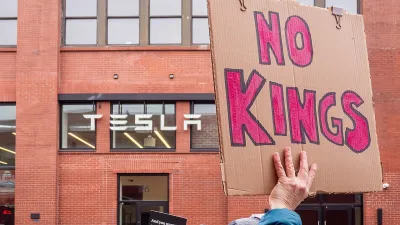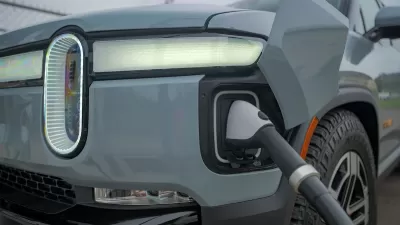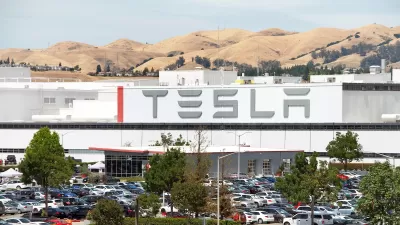This weekend, I had the pleasure of taking a ride up the Pacific Coast Highway in a hot-off-the-assembly-line Tesla sportscar. While I normally fall in with the camp that thinks the focus on alternative fuel cars is distracting from the need to move people out of cars and into transit, walking and biking, I have to say, the Tesla Roadster is a beautiful piece of machinery.
This weekend, I had the pleasure of taking a ride up the Pacific Coast
Highway in a hot-off-the-assembly-line Tesla sportscar. While I
normally fall in with the camp that thinks the focus on alternative
fuel cars is distracting from the need to move people out of cars and
into transit, walking and biking, I have to say, the Tesla Roadster is
a beautiful piece of machinery.
Besides which, the Tesla is some seriously sexy green technology. It's
a fully-electric car that can achieve zero-to-sixty in less than 4
seconds, a sensation that is truly thrilling. If you've ridden one of
these new roller coasters like California Screamin' at Disneyland that launch your train up the first hill, you've got an idea of what that feels like. It also has a
reported range of 221 miles, considerably more than most people drive
each day.

My host also uses solar panels on the roof of his home to charge it up – Tesla cross-markets the solar panels, in an admirable example of integrated green technologies.
But setting aside my embarrassingly gaga response to a fine piece of driving technology, the reason I bring this up is to introduce a question that deserves some consideration as the big American auto manufacturers make the rounds in Washington this month, hat in hand. How much are we willing to spend limited tax dollars to bail out companies that can't or won't innovate fast enough? And is it possible to leverage consumer demand to fuel innovation in other industries, particularly those that provide fewer thrills for early adopters?
Just this morning, I read that Ford has a new car called the Fiesta ECOnetic that runs on diesel and gets 65 mpg, but executives have decided not to sell it in America because they don't believe Americans will buy it. The big car companies lack faith in America's willingness to change -- much like the McCain campaign failed in the recent election -- and it is dragging the automobile industry to its grave.
Of course, it's necessary to mention the huge caveat that this car cost a cool $100k. Elon Musk, the chairman of Tesla, writes: "Almost any new technology initially has high unit cost before it can be optimized and this is no less true for electric cars. The strategy of Tesla is to enter at the high end of the market [with the roadster], where customers are prepared to pay a premium, and then drive down market as fast as possible." With that in mind, Tesla plans to release a family car and an economy model at a fraction of the price of the roadster. "All free cash flow is plowed back into R&D to drive down the costs and bring the follow on products to market as fast as possible. When someone buys the Tesla Roadster sports car, they are actually helping pay for development of the low cost family car."
As a faithful urban planner in the walk/bike/transit mode, and someone who believes that peak oil is not an invention but an imperative, my ride in the Tesla gave me pause. I believe that cars are not the future, and that we need to build city and town centers around people rather than vehicles. But the Tesla Roadster gives me hope for technology's role in saving the world. If Americans can still design something as innovative and exciting as this, perhaps the new green energy imperative really will create a brighter future.

Alabama: Trump Terminates Settlements for Black Communities Harmed By Raw Sewage
Trump deemed the landmark civil rights agreement “illegal DEI and environmental justice policy.”

Study: Maui’s Plan to Convert Vacation Rentals to Long-Term Housing Could Cause Nearly $1 Billion Economic Loss
The plan would reduce visitor accommodation by 25% resulting in 1,900 jobs lost.

Planetizen Federal Action Tracker
A weekly monitor of how Trump’s orders and actions are impacting planners and planning in America.

Waymo Gets Permission to Map SF’s Market Street
If allowed to operate on the traffic-restricted street, Waymo’s autonomous taxis would have a leg up over ride-hailing competitors — and counter the city’s efforts to grow bike and pedestrian on the thoroughfare.

Parklet Symposium Highlights the Success of Shared Spaces
Parklets got a boost during the Covid-19 pandemic, when the concept was translated to outdoor dining programs that offered restaurants a lifeline during the shutdown.

Federal Homelessness Agency Places Entire Staff on Leave
The U.S. Interagency Council on Homelessness is the only federal agency dedicated to preventing and ending homelessness.
Urban Design for Planners 1: Software Tools
This six-course series explores essential urban design concepts using open source software and equips planners with the tools they need to participate fully in the urban design process.
Planning for Universal Design
Learn the tools for implementing Universal Design in planning regulations.
Caltrans
Smith Gee Studio
Institute for Housing and Urban Development Studies (IHS)
City of Grandview
Harvard GSD Executive Education
Toledo-Lucas County Plan Commissions
Salt Lake City
NYU Wagner Graduate School of Public Service






























